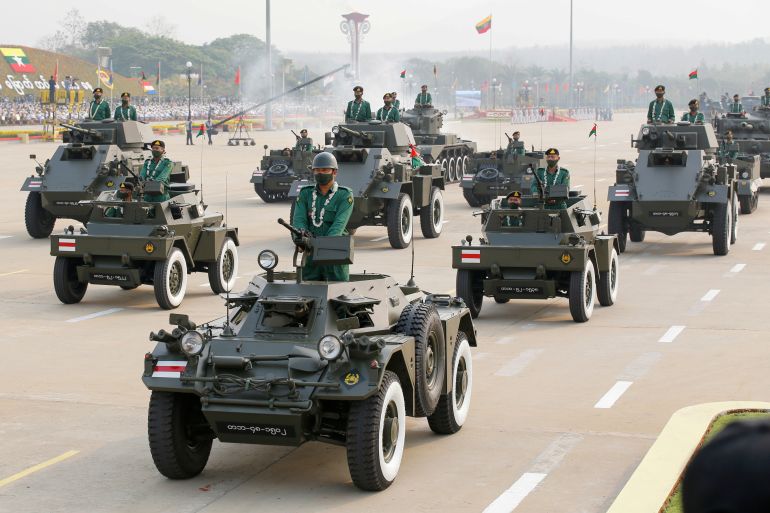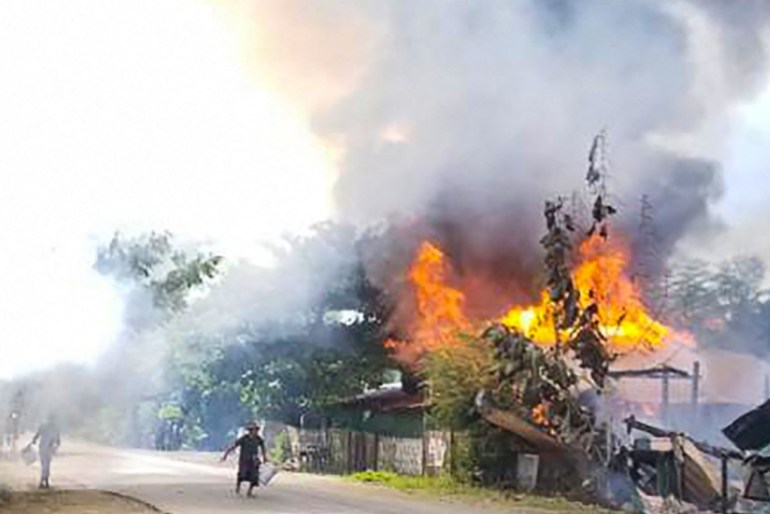Min Aung Hlaing blames opposition for violence after ASEAN snub
The Southeast Asian grouping decided to exclude coup leader from summit because of the lack of progress in a peace plan agreed in April.

Myanmar army chief Min Aung Hlaing, snubbed by ASEAN leaders over this month’s regional summit, has said that while the military wanted to restore order and bring peace to a country plunged into turmoil by its February 1 coup, it was its opponents that were causing violence.
Coup leader Min Aung Hlaing made the comments in an address on state television on Monday, after the Association of Southeast Asian Nations (ASEAN) announced over the weekend that it would invite a “non-political” representative from Myanmar in an unprecedented snub that drew anger in the capital, Naypyidaw.
Keep reading
list of 4 itemsUN chief delayed ASEAN meeting to avoid Myanmar army envoy
Myanmar won’t allow ASEAN envoy to meet Aung San Suu Kyi
Ex-Myanmar president says army tried to force him to cede power
The leaders of ASEAN’s 10 members are due to meet from October 26-28.
“More violence happened due to provocations of terrorist groups,” Min Aung Hlaing said in a speech on television, referring to those opposed to the military’s rule. “No one cares about their violence, and is only demanding we solve the issue. ASEAN should work on that.”
The military ended Myanmar’s gradual transition to democracy when it seized power just as parliament was due to convene following elections that returned Aung San Suu Kyi’s National League for Democracy (NLD) to power in a landslide.
The coup prompted mass protests amid widespread opposition to military rule with some people heading to the country’s borderlands to train with ethnic armed groups that have been fighting the military for decades.
Security forces have killed some 1,178 people, including children, since the coup, according to the Assistance Association for Political Prisoners (AAPP), a human rights group that has been tracking the situation.
‘Important step’
Earlier, the shadow National Unity Government (NUG), which in September declared an uprising against the generals, welcomed ASEAN’s decision.
The NUG added that while it should be seen as the country’s legitimate representative, it was willing to accept an alternative that was truly neutral. The NUG includes some NLD representatives who were among those removed from office by the generals.
“ASEAN excluding Min Aung Hlaing is an important step, but we request that they recognise us as the proper representative,” said its spokesman Dr Sasa..


As part of measures agreed under a five-point action plan with ASEAN in April, the military was supposed to end violence and allow an ASEAN special envoy to visit the country to meet all parties, including Aung San Suu Kyi, who has been detained since February 1.
But fighting has continued to flare, especially in border areas such as northwestern Chin state where thousands have been forced from their homes. Last week, the military also said that the ASEAN envoy would not be allowed to meet Aung San Suu Kyi.
After a special meeting that convened on Friday, ASEAN said there had been “insufficient progress” on the agreement to warrant Min Aung Hlaing being invited to this month’s summit.
A spokesman for Myanmar’s military government blamed “foreign intervention” for the decision which it said was against the objectives of ASEAN, the ASEAN Charter and its principles.
The grouping, which operates on the principles of consensus and non-interference in each other’s domestic affairs, admitted Myanmar as a member in 1997 under a previous military regime.
More than 9,000 people have been arrested since the coup, according to AAPP.
On Monday, in an announcement on state television, the military said that more than 5,600 of those people would be released. It previously announced mass releases of prisoners in April and June. The people released in April were mainly those jailed before the coup.